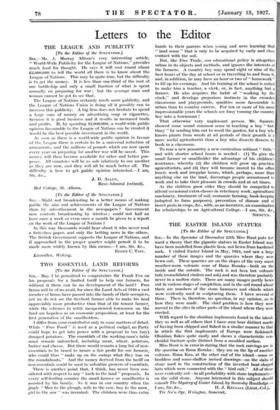TWO ESSENTIAL LAND REFORMS
[To the Editor of the SPECTATOR.] SIR,—May I be permitted to congratulate Sir Frank Fox on his pmposal-.; for a limited tariff to help our farmers, for without it there can he no development of the land ? Free farms will he of no avail, for since the Land Acts of 1910 a vast number of farms have passed into the hands of their occupiers, yet we do not see the freehold farmer able to make his land appreciably more productive than that of the tenant farmer, while the schemes to settle inexperienced townsmen on the land are hopeless as an economic proposition, at least for the first generation of the smallholders.
I differ from your contributor only in some matters of detail. While " Free Food " is used as a political cudgel, no Party could hope to get into power with a proposal to tax (say) slumped potatoes. The essentials of the working-man's table must remain untouched, including meat, wheat, potatoes, butter and cheese. But there would remain a long list of non- essentials to he taxed to insure a fair profit for our farmers, who could thus " make up on the swings what they lose on the roundabouts." And the money derived from the tariff on non-essentials could be used to subsidize growers of essentials.
There is another point that, I think, has never been con- sidered with respect to any " back to the land " proposals. In every self-feeding country the small farmer or smallholder is assisted by his family. So it was in our country when the jingle " Man to the plough, wife to the cow, boy to the-mow, girl to the sow was invented. The children were thus extra hands to their parents when young and were learning that " land sense " that is only to be acquired by early and close contact with the soil.
But, like Free Trade, our educational policy is altogether urban in its objects and methods, and ignores the interests of the farmers. A country boy may spend eight or nine of the best hours of the day at school or in travelling to and from it, and, in addition, he may have an hour or two of * homework " to fill up his evenings. And his training at the school is suited to make him a teacher, a clerk, or, in fact, anything but a farmer. He also acquires the habit of "-working by the clock," and develops gregarious instincts in the crowded classrooms and playgrounds, qualities more favourable to urban than to country careers. For- ten or more of his most impressionable years the schools are busy turning the country boy into a townsman !
That otherwise very unpleasant person, Mr. Squeers, showed some sound common sense in teaching a boy " hot. tiney " by sending him out to weed the garden, for a boy who knows plants from weeds at all periods of their growth is a more useful agriculturist than a boy who dissects flowers by book in a classroom.
To rear a new peasantry a new curriculum without " frills" and with shorter school hours is needed (1) To give the small farmer or smallholder the advantage of his children's assistance, whereby (2) the children will grow up practical agriculturists, and (3) they will become inured to the often lonely work and irregular hours, which, perhaps, more- than anything else on the land, discourage people accustomed to work and to take their pleasure in crowds and at set times.
As the children grow older they should be compelled to attend occasional extra classes in veterinary work, agricultural machinery, treatment of soil, economic farming, book-keeping (adapted to farm purposes), prevention of disease and of insect pests in crops, &e., with, as an incentive, an examination for scholarships to an Agricultural College.—I am, Sir, &e.,
SIENCYN.


































 Previous page
Previous page